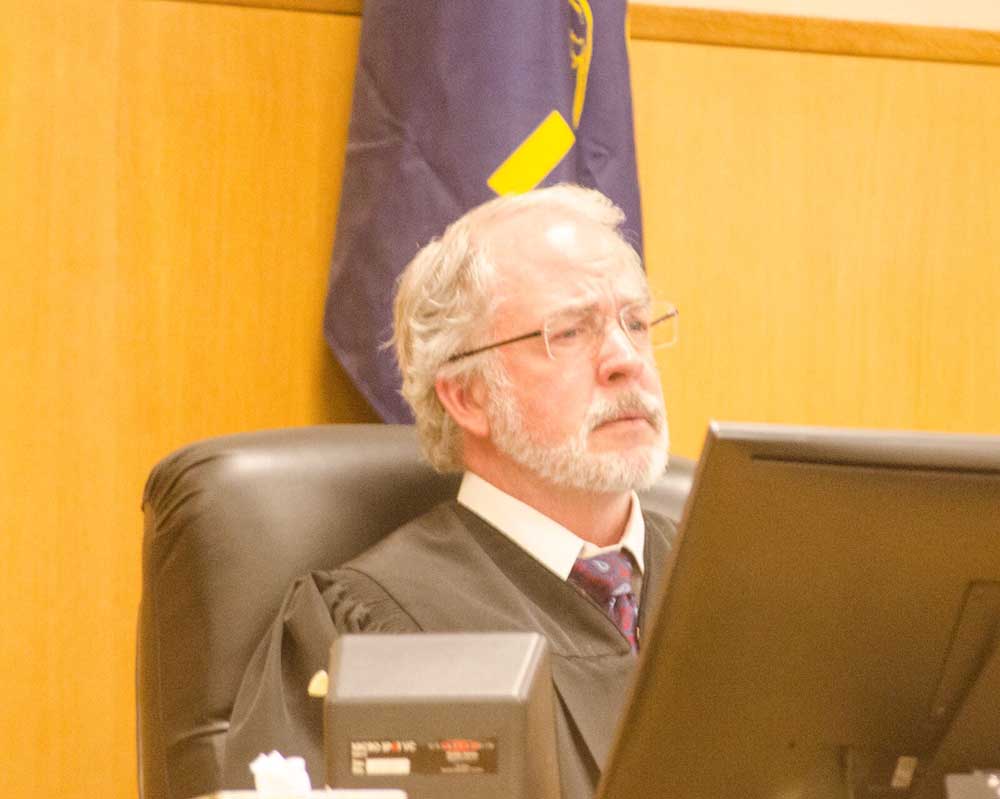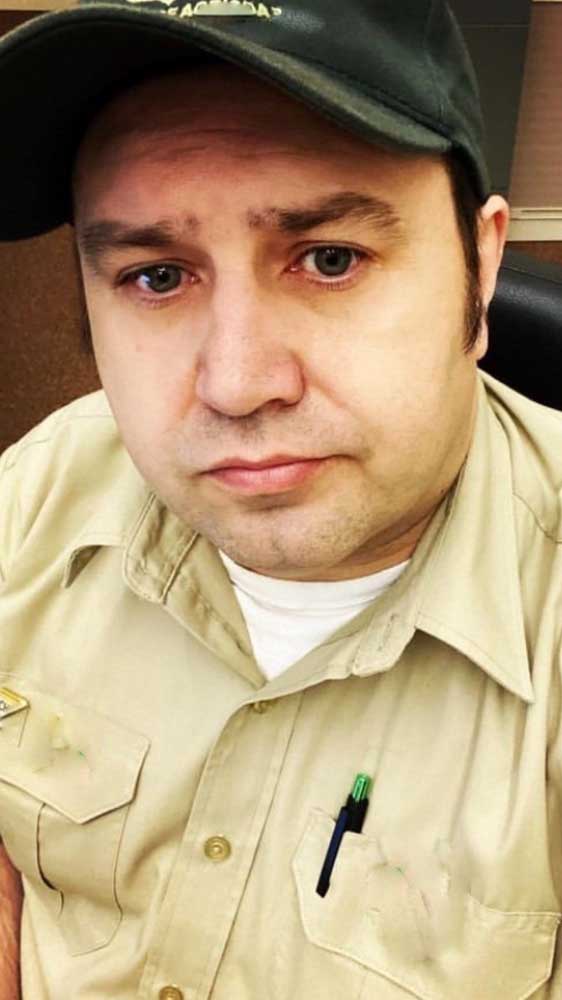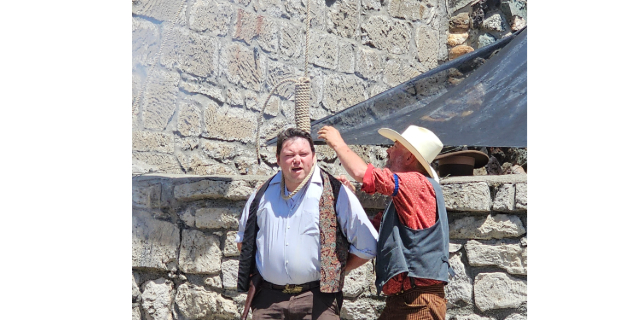Defense accuses prosecutors of withholding evidence in former Grant County deputy’s attempted rape trial
Published 3:16 pm Tuesday, May 3, 2022

- Klamath County Circuit Court Judge Dan Bunch
A Circuit Court hearing on a motion to dismiss criminal charges against a former Grant County sheriff’s deputy accused of assault, attempted rape and child neglect got underway on April 20, with defense attorneys claiming that prosecutors had been withholding crucial evidence that could clear their client of any wrongdoing.
The trial of Tyler Smith, slated to begin in late October, was abruptly put on hold to give defense attorneys time to sift through hundreds of pages of discovery materials filed just one day earlier by the prosecution.
Those materials consisted mostly of internal documents and reports from the Grant County Sheriff’s Office, which fired Smith in December 2019, three months after his arrest on the charges in this case. There were also two recorded interviews with Smith’s accuser, including one in which she acknowledged placing a tracking device on Smith’s vehicle and keeping the Grant County Sheriff’s Office informed of his whereabouts.
Andrew Coit, one of Smith’s attorneys, said the prosecution had committed an egregious violation of the Brady Rule, which requires exculpatory evidence — information that could acquit a defendant in a criminal case — to be turned over to the defense by the government.
The Brady Rule is named after the 1963 U.S. Supreme Court case Brady v. Maryland.
In a motion to dismiss with prejudice filed with Grant County Circuit Court on April 29, Coit argued the prosecution had suppressed evidence favorable to the defense for nearly two and half years.
Jamie Kimberly, an assistant Oregon attorney general acting as a special prosecutor in the case, said prosecutors were unaware of the October dump of discovery materials until the last minute.
She said she had only become aware of the recordings after reviewing the defense’s witness list. She said as soon as she found out about the taped interviews, she retrieved them from Grant County Sheriff’s Sgt. Danny Komning the day before the trial was set to begin.
All along, however, the prosecution has argued that Smith’s personnel file and items related to it are not relevant to the case since the Oregon State Police, not the Grant County Sheriff’s Office, investigated the criminal allegations.
How we got here
Smith was arrested on charges of attempted rape, fourth-degree assault and child neglect on Sept. 9, 2019, and then fired by the Grant County Sheriff’s Office on Dec. 17, 2019, several months before having an opportunity to enter a not guilty plea on April 30, 2020.
Smith maintains that the criminal charges against him were part of a plan by former Grant County Sheriff Glenn Palmer, Undersheriff Zach Mobley, Mobley’s wife, Abigail, and Komning, her older brother, to have him removed from the Sheriff’s Office and get him arrested.
That plan, Smith asserts, was in retaliation for allegations Smith made to the Oregon Department of Justice on July 31, 2019, that Abigail Mobley had used illegal drugs and had a sexual relationship with an inmate incarcerated for drug crimes while she was a jail deputy with the Grant County Sheriff’s Office.
Smith also argues that his accuser was a close friend of the Mobleys and Komning.
After a 21-month investigation found that Abigail Mobley committed eight violations of the department’s code of conduct, ranging from abuse of her position to conduct unbecoming an officer and neglect of duty, she resigned from the Sheriff’s Office on Dec. 26, 2021, following a 30-day suspension.
Abigail Mobley, who was on paid leave throughout the investigation, was not found to have used illegal drugs.
Conflicting testimony
One of the recorded interviews with Smith’s accuser was conducted by Komning on June 20, 2019. The date of the interview, according to Smith’s other defense attorney, Andrea Coit (wife of Andrew), is important.
In Smith’s federal lawsuit for wrongful termination and civil rights violations, he states that Palmer called him into his office that day and berated him, saying he knew that Smith planned to make allegations about Abigail Mobley in an upcoming interview with the Department of Justice, which was investigating her.
Komning testified that Zach Mobley had called him in on his day off to come into the Sheriff’s Office and Palmer told him to interview Smith’s accuser and the accuser’s coworker.
According to Komning, Palmer told him Smith had been seen “spying” on the Mobleys. Additionally, Komning testified that Palmer was concerned about the safety of Smith’s accuser and Smith’s children.
In a court hearing last week, Palmer testified that he did not recall having a conversation with Komning about investigating Smith regarding safety concerns or the alleged spying on the Mobleys.
Upon being shown the report from Komning’s interview of Smith’s accuser and the coworker, Palmer said he told Komning to take the investigation to an outside agency.
Zach Mobley testified that, other than receiving a phone call that Smith had left his kids at home unattended and turning the report over to the John Day Police Department, he had no recollection of being involved with initiating any kind of formal or informal investigation into Smith.
Komning said he asked the Wheeler County sheriff to conduct an internal affairs investigation of Smith, and the sheriff recorded another interview with Smith’s accuser.
In that interview, according to the recording that was played in court on April 20, Smith’s accuser acknowledges placing a tracker on Smith’s vehicle and keeping the Grant County Sheriff’s Office updated on Smith’s whereabouts.
Komning testified that he was not aware of Smith’s scheduled interview with the DOJ to talk about alleged misconduct by his sister at the time he conducted his interview with Smith’s accuser. According to Komning, he was acting on Palmer’s concerns about the safety of Smith’s accuser and the children.
In court, the defense pointed to what it called contradictions between Koming’s statements and Palmer’s April 27 testimony. Under cross-examination, the former sheriff said he did not remember saying those things to Komning.
“I don’t recall what the conversation was with Danny Komning,” Palmer said. “If that’s what he testified, then that’s his testimony. I don’t recall it.”
Additionally, Komning testified that Palmer was concerned that Smith had been spying on the Mobleys.
In the interview, Komning told Smith’s accuser that Smith had changed and that he was concerned about the safety of those around him. The accuser asked Komning to go off the record. In Komning’s report, the accuser makes contradictory statements, first claiming Smith had been “abusive” with the children, then saying he is good with the kids but that he was neglecting them.
The defense asked Komning if he reported the abuse to the Department of Human Services given that, as a patrol deputy and a mandatory reporter, he was required by law to report such an allegation.
Komning said what the accuser told him did not meet the threshold of abuse. Moreover, he said he thought submitting the report to Palmer was enough to meet the mandatory reporter requirement.
Asked why he did not turn over the recording to prosecutors, Komning said that he did not think the recording was relevant to Smith’s criminal case.
Palmer and the prosecutor
After the first day of the hearing on April 20, the defense amended its motion to dismiss based on testimony by Jim Carpenter, Grant County’s district attorney.
Carpenter testified that Palmer had emailed him asking for assistance in finding a legal avenue to arrest Haley Olson, Smith’s girlfriend, who claimed on social media that she had documents that proved Smith was innocent of the charges brought against him.
Carpenter said he directed Palmer to work with Gretchen Ladd-Dobler, Wheeler County’s district attorney, one of the special prosecutors, along with Kimberly, who was handling Smith’s case.
The defense attorneys argue that Carpenter’s testimony shows Palmer was looking for a way to suppress documents that could be used to exonerate Smith. They have asked the state to produce additional emails in a thread between Palmer, Carpenter and Ladd-Dobler that was among the discovery materials submitted in October.
In Kimberly’s cross-examination of Carpenter, she asked if Palmer’s inquiry went any further than the email thread.
Ladd-Dobler’s participation in the case has come under scrutiny given that she is the wife of Grant County Sheriff’s Deputy Dave Dobler. The defense asked Carpenter — who asked her to take on the Smith case — if he saw a potential conflict of interest because of that relationship.
Ladd-Dobler told the newspaper in September of 2020 that Smith’s criminal case was investigated by the Oregon State Police and not the Grant County Sheriff’s Office. She went on to say that district attorneys, not victims, decide if criminal cases move forward.
The failure to turn over the recordings and related documents until just before the start of trial, according to Smith’s defense attorneys, points to a consistent pattern on the part of the prosecutors of improperly withholding evidence that could exonerate the defendant.
The prosecutors, however, reject that line of reasoning entirely, arguing that none of those materials are relevant to the criminal charges against Smith. Therefore, they insist, the charges against him should not be thrown out.
‘Hide the ball’
Smith’s attorneys claim the evidence suppression has been a constant for two and a half years.
“This case,” Andrew Coit said during a court hearing on April 27, “has been for the DA’s Office and law enforcement about hide the ball.”
The controversy, which could change the course of Smith’s case by leading to another continuance or even a dismissal, began on the first day of the trial in late October.
After the issue of the last-minute discovery dump was raised, Circuit Court Judge Dan Bunch called an on-the-record hearing in his chambers with the attorneys for both sides, court transcripts show.
During that conference, Bunch told Kimberly that it sounded to him as though Smith had patrol deputies within the Sheriff’s Office working against him.
“They have not made your job easy,” Bunch told the prosecutor. “(I) am concerned there are officers not shooting straight with you. (I) will tell you, as far as a conviction you have an uphill battle.”
For her part, Kimberly told the judge she appreciated his concerns but that the prosecution was confident in its case.
The trial is slated to get underway on May 16, but Smith’s attorneys filed a motion on Friday, April 29, for a postponement to allow time for more testimony on their motion to dismiss.
The state objects to the postponement.
“The facts tend to suggest that Grant County has played a significant role in both the development of the criminal allegations and the pursuit of the indictments,” Smith’s attorneys argue.
“Yet the state continues to both hide evidence it is required to disclose and to interfere with the Defendant’s right to a fair trial, evidenced again by its opposition to this request for a continuance of the trial date.”
An oral argument on the postponement motion is scheduled for 9 a.m. on Monday, May 9, at the Grant County Courthouse.





